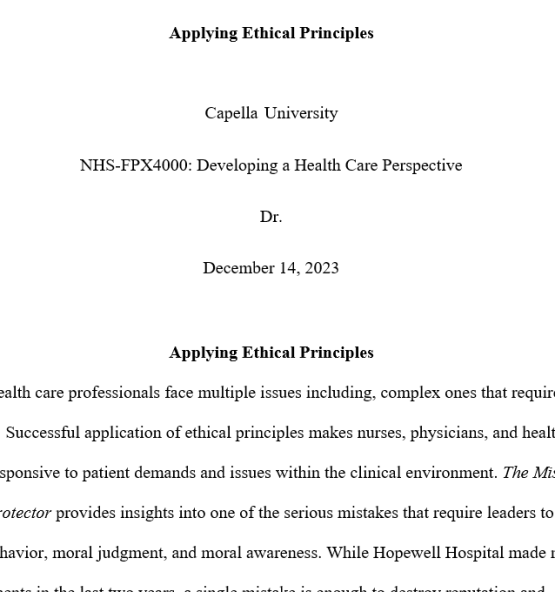


Applying Ethical Principles
Capella University
NHS-FPX4000: Developing a Health Care Perspective
Dr.
December 14, 2023
Availability:In Stock
Health care professionals face multiple issues including, complex ones that require sound decisions. Successful application of ethical principles makes nurses, physicians, and health leaders responsive to patient demands and issues within the clinical environment. The Missing Needle Protector provides insights into one of the serious mistakes that require leaders to apply ethical behavior, moral judgment, and moral awareness. While Hopewell Hospital made notable improvements in the last two years, a single mistake is enough to destroy reputation and jeopardize the brand financial success.
The Missing Needle Protector highlights one of the sensitive issues that could affect a brand reputation. New programs developed by the director of clinical services allowed Hopewell Hospital to make significant progress in improving quality and safety of care. However, the facility failed to address key issues such as avoiding exposing patients to adverse care outcomes associated with a physically and mentally declining staff (Capella University, n.d). Cutrite, a general surgeon with declining capabilities continued to perform a full range of procedures. The surgical team left a plastic needle protector from a disposable syringe in Mrs. Jameson’s belly. The operating room supervisor claimed that the red-pink color of the protector made it impossible to detect it in a wound. The dilemma involves making a decision whether to return the patient into surgery to look for the needle cover or let hear leave with the object. The director of clinical services has a difficult time seeking informed opinion on the right course of action.
The Missing Needle Protector highlights serious concerns that raise questions about the safety and quality of care. One concern is the likelihood of the surgical team acting negligently by failing to have accurate and complete assessment of items in the surgical pack after the surgery. Discrepancy revealed after reconciling records at the end of the week showed the need for the director of clinical services to ensure that only competent surgeons handle patients. The scrub nurse failure to think about the protective sheath at the conclusion of the surgery also portray gaps in oversight, training, and safety culture. Thus, the ethical issue revolves around the absence of robust risk assessment structures, triggered by the presence of a mentally and physically declining surgeon. Failure to exclude Cutrite from the operation is among the factors that led to the team failing to notice the missing needle protector from the surgical pack.
Moral awareness, ethical behavior, and moral judgment determine individual ability to make informed decisions when facing a dilemma. Moral awareness makes everyone regardless of their position aware of the implications of negligence and ineffective handling of clinical procedures (Borhani et al., 2021). This way, moral awareness makes everyone alert to identify and intercept errors and near misses throughout the care process. For moral judgment, members of the care team including, the scrub nurse, surgeon, and operating room supervisor understand the implications of wrong decisions.
The team remains extra vigilant in confirming instruments used during the surgery to detect and respond to anomalies on time. Allowing Cutrite to continue handling sensitive procedures despite physical and mental decline raises questions about the level of moral awareness and moral judgment. However, the director’s commitment to understanding the issue and making an informed decision portray a high level of moral awareness and judgment. Ethical behavior encourages the care team to fulfill a patient’s best interests. Including Cutrite in the surgical team was a wrong decision. However, the operating room supervisor and the scrub nurse’s honesty capture their commitment to upholding ethical behaviors to achieve the best outcomes.
Reviews
There are no reviews yet.